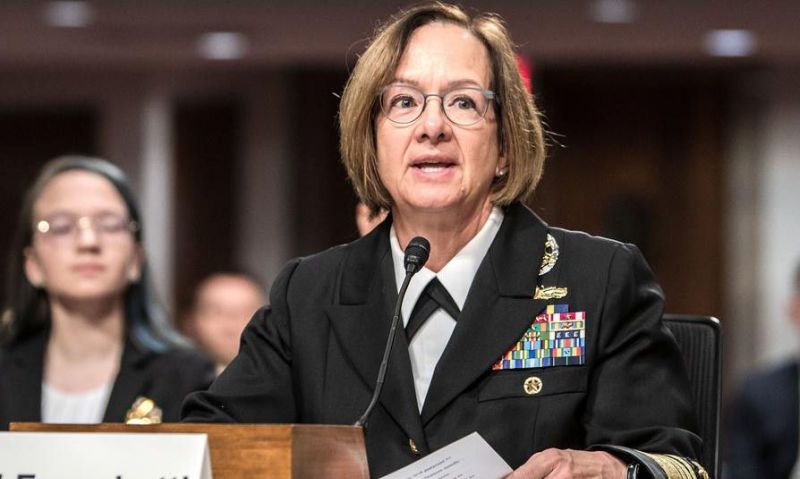
Navy’s recovery from Tuberville’s hold on military promotions will take years, acting CNO says
The acting chief of naval operations said Thursday that it will take the Navy years to recover from the delay on promotions caused by Sen. Tommy Tuberville’s procedural hold on military nominees.
Adm. Lisa Franchetti, the nominee for the Navy’s highest-ranking position, told the Senate Armed Services Committee that untangling the monthslong blockade of more than 300 nominations and appointments would take three to four months for three-star officers alone.
“The Navy’s facing challenges all around the globe, threats from our adversaries. We want to have the right people with the right level of experience in those positions,” Franchetti said. “And as we continue not to have the confirmed people that we’ve nominated with that experience, we’re going to continue to see an erosion of readiness.”
Her own nomination to permanent chief of naval operations is expected to be stalled by Tuberville, R-Ala., as he refuses to let the Senate move forward on senior military confirmations in a bid to force the Pentagon to rescind an abortion access policy.
Franchetti would become the first woman to lead the Navy and serve on the Joint Chiefs of Staff, if confirmed. She has been filling the role of chief of naval operations in an acting capacity following the retirement last month of Adm. Michael Gilday.
Officials serving on an acting basis are prevented from making long-term plans, such as hiring decisions, and cannot move into housing that comes with the job.
Franchetti told senators Thursday that she is personally seeing the impact of Tuberville’s hold on military families, who have been left uncertain of when they will have to move or where they will live.
“We ask a lot of our families: to move, to uproot, find new schools, find new jobs for spouses,” she said. “I have heard a lot of concerns from our families that they are having difficulty navigating that space right now.”
The list of frozen military promotions includes Rear Adm. Yvette Davids, who was nominated in April to become the first female superintendent of the U.S. Naval Academy. The academy for the first time in 60 years began the school year last month without a confirmed superintendent, according to Sen. Elizabeth Warren, D-Mass.
“Every young person who is thinking right now about applying to the academy, and every young person anywhere in the Navy must confront head-on the fact that Sen. Tuberville has turned the Navy and the Naval Academy into one more political football,” Warren said.
Tuberville, a member of the Armed Services committee, told Franchetti on Thursday that he looked forward to working with her but did not address his hold.
Sen. Kevin Cramer, R-N.D., pushed back against accusations from Warren that Republicans did not care about military leaders or their families. When he asked Franchetti to comment, she said: “I believe that everyone in Congress supports everyone in our military.”
The pressure to resolve the standoff between Tuberville and the Pentagon heightened this week as the Senate held confirmation hearings for Gen. David Allvin, nominated for Air Force chief of staff, and then Franchetti on Thursday.
Half of the eight seats on the Joint Chiefs of Staff, a body of the most senior uniformed military leaders, will be vacant when Army Gen. Mark Milley, the group’s chairman, retires Oct. 1. The Pentagon said this week that the Joint Chiefs vice chairman would take over for Milley in an acting capacity if the Senate cannot confirm Air Force Gen. C.Q. Brown for the job in time.
The Army, Marine Corps and Navy have all been left without Senate-confirmed leaders due to Tuberville’s hold.
Tuberville and other Republicans have argued the Senate can easily go around the blockade by holding individual votes on nominees. But a memo released by Senate Democrats this week showed that process would last at least 89 days.
The memo, prepared by the Congressional Research Service in August, estimated it would take the Senate nearly 700 hours of floor time to vote on 273 military nominations. The number of affected nominees has since grown to more than 300.
Senate Majority Leader Chuck Schumer, D-N.Y., who has refused to hold roll call votes on any of the blocked promotions, said Thursday that only Republicans can end the blockade.
“The bottom line is this: this is a Republican problem. It was created by the senator from Alabama, no one else, and it’s up to Republicans to put pressure on him to back off, plain and simple,” he said.
